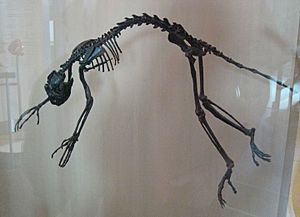Adapiform facts for kids
Quick facts for kids Adapiform |
|
|---|---|
 |
|
| Notharctus tenebrosus | |
| Scientific classification | |
| Kingdom: | |
| Order: | |
| Suborder: | |
| Infraorder: |
†Adapiformes
|
| Families | |
|
|
Adapiforms are an extinct group of early primates. Adapiforms radiated throughout much of the northern continental mass, reaching as far south as northern Africa and tropical Asia. They lived from the Eocene to the Miocene epochs. Some adapiforms looked similar to living lemurs.
Adapiforms are known from the fossil record only, and it is unclear whether they form a monophyletic or paraphyletic group. When assumed to be a clade, they are usually grouped under the "wet-nosed" taxon Strepsirrhini, which would make them more closely related to the lemurs and less so to the "dry-nosed" Haplorhini taxon that includes monkeys and apes.
In 2009, Franzen and colleagues put the newly described genus Darwinius as a stem "missing link" between Strepsirrhini and Haplorhini. Later work on the Darwinius fossil by Erik Seiffert and colleagues rejected this "missing link" idea. They classify Darwinius and other adapiforms as Strepsirrhini.
Fossil record
The fossil record of the Adapiforms is quite considerable. The fossils are first found in the earliest Eocene, 55 million years ago (mya). They lived in four continents (North America, Africa, Europe and Asia). The Eocene was a period when the Earth was much warmer than today, with very extensive tropical forests, far more so than today. The widespread remains mean a much earlier origin, and molecular clock dates suggest that primates evolved more than 80–90 mya, nearly 40 million years before they appear in the fossil record.
See also
 In Spanish: Adapiformes para niños
In Spanish: Adapiformes para niños

